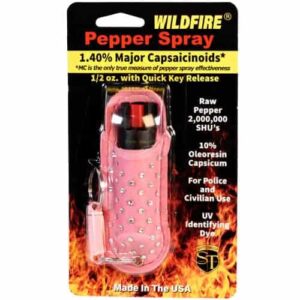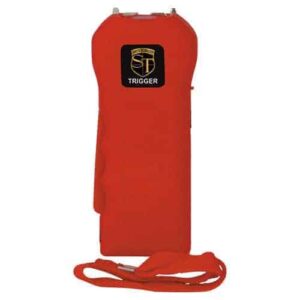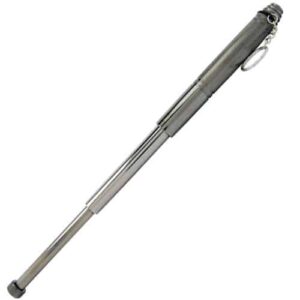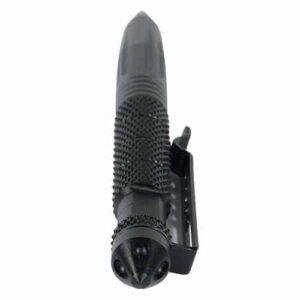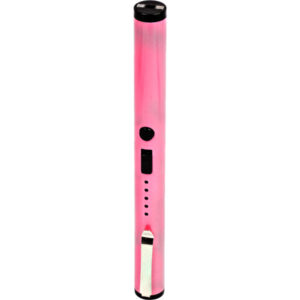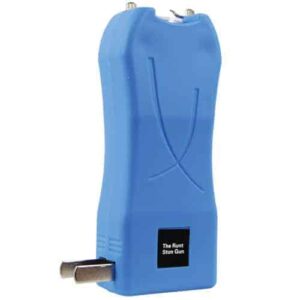Imagine you’re a security guard, responsible for the safety of a building or an event. In order to effectively protect others and yourself, you need the right tools at your disposal. This is where pepper spray comes in. As an essential part of security guard training, pepper spray equips guards with a powerful non-lethal weapon that can temporarily incapacitate an assailant. In this article, we will explore the crucial role that pepper spray plays in security guard training, discussing its benefits, proper usage, and the importance of regular training to ensure its effective deployment in emergency situations.
Table of Contents
ToggleReasons for Incorporating Pepper Spray in Security Guard Training
Increasing Personal Safety
Pepper spray is a valuable tool for enhancing the personal safety of security guards. By carrying pepper spray, guards have a non-lethal means of protecting themselves against potential threats. This increases their confidence and allows them to focus on their duties without constantly worrying about their own safety.
Enhancing Confidence and Preparedness
Knowing how to properly use pepper spray can greatly enhance a security guard’s confidence and preparedness. By receiving comprehensive training on pepper spray usage, guards gain a deeper understanding of their capabilities and limitations. This knowledge allows them to approach their job with a heightened sense of self-assurance, knowing that they have a reliable means of defense at their disposal.
Non-Lethal Deterrence
Pepper spray provides security guards with the ability to deter potential threats without causing permanent harm. The intense burning sensation and temporary loss of vision it inflicts can effectively discourage individuals from engaging in harmful or aggressive behavior. This non-lethal deterrent allows guards to maintain peace and order while minimizing the risk of escalating a situation to a potentially fatal level.
Effective Tool for Self-Defense
In situations where physical force may be necessary, pepper spray serves as an effective tool for self-defense. Its ability to incapacitate an attacker without causing long-term harm makes it a valuable asset for security guards. Pepper spray can buy valuable seconds that allow guards to gain the upper hand or call for backup, ensuring their safety and the safety of others.
Mitigating Potential Legal Liabilities
By incorporating pepper spray into security guard training, organizations can mitigate potential legal liabilities. When trained properly, guards are equipped with the knowledge and skills to assess and respond to situations appropriately. This helps prevent the unnecessary use of force and reduces the risk of legal complications that can arise from excessive or improper use of force.
Legislation and Regulations Surrounding Pepper Spray Usage
Legal Restrictions and Limitations
It is crucial for security guards to understand the legal restrictions and limitations associated with pepper spray usage. Laws regarding pepper spray can vary from one jurisdiction to another, with different states and countries having specific regulations in place. Guards must familiarize themselves with these laws to ensure that they use pepper spray within the boundaries of the law.
Training Requirements
Many jurisdictions impose training requirements for security guards who wish to carry pepper spray. These requirements often dictate the minimum number of training hours and the topics that must be covered. It is essential for guards to undergo comprehensive training to ensure they understand the proper use and deployment of pepper spray. This training should address legal considerations, safety precautions, and effective techniques.
Understanding the Legal Justifications for Use
Security guards must also have a clear understanding of the legal justifications for using pepper spray. This includes knowing when the use of force is deemed necessary, the circumstances in which pepper spray may be used, and the level of force that is considered reasonable and proportionate. By understanding these legal justifications, guards can make informed decisions and act responsibly within the confines of the law.

Components of Pepper Spray and How It Works
Active Ingredients in Pepper Spray
Pepper spray contains an active ingredient called oleoresin capsicum (OC), which is derived from chili peppers. OC is a potent irritant that causes intense burning and pain when it comes into contact with the eyes, skin, or respiratory system. The concentration of OC in pepper spray can vary, with higher concentrations typically resulting in a more intense reaction.
Spray Delivery Systems
Pepper spray is available in various delivery systems, including aerosol cans, foam dispensers, and gel projectiles. Each delivery system has its own advantages and considerations. Aerosol cans, for example, provide a spray that covers a wider area, while foam dispensers create a more targeted stream. Guards should familiarize themselves with the different delivery systems to choose the most appropriate one for specific situations.
Impact on the Target’s Senses and Physiology
When pepper spray is deployed, it immediately affects the target’s senses and physiology. The capsaicinoids in pepper spray cause an intense burning sensation in the eyes, temporary blindness, difficulty breathing, and uncontrollable coughing. These effects incapacitate an attacker, rendering them unable to continue their aggressive behavior. It is important for guards to understand the physiological impact of pepper spray to accurately assess its effectiveness and ensure they are prepared to handle the aftermath.
Dealing with Cross-Contamination
One potential concern when using pepper spray is the risk of cross-contamination. If the wind is blowing or the target is in close proximity to others, there is a possibility that the pepper spray will affect unintended individuals. Guards must be aware of this risk and take precautions to minimize the chances of cross-contamination. Proper aim, tactical positioning, and consideration of the surroundings can help reduce the risk of unintentional exposure.
Training Methods for Proper Pepper Spray Use
Safety Precautions and Equipment
Safety should be a top priority when training security guards on proper pepper spray use. Guards must be instructed on the necessary safety precautions, including how to properly handle and store pepper spray canisters, the importance of wearing protective gear during training exercises, and the need to exercise caution to prevent accidental discharge. Training should also cover the potential hazards associated with pepper spray use to ensure guards are well-informed.
Understanding the Effectiveness Range
Pepper spray has a limited range, and understanding this limitation is critical in training security guards. Guards must learn to accurately gauge the distance at which pepper spray can effectively incapacitate an attacker. They need to be familiar with the spray pattern and range of their specific canister to ensure they maintain a safe distance while still effectively neutralizing a threat.
Practicing Proper Aiming and Delivery Techniques
Proper aiming and delivery techniques are essential for maximizing the effectiveness of pepper spray. Security guards should receive thorough training on how to aim and deliver the spray accurately, ensuring it reaches the intended target. This includes teaching guards how to maintain a steady hand, adjust their aim based on the target’s movement, and deploy the spray in a controlled manner to prevent wastage.
Recognizing Environmental Factors and Adjusting Tactics
Training security guards on pepper spray usage should also include educating them on environmental factors that can impact its effectiveness. Factors such as wind direction, confined spaces, and proximity to innocent bystanders can significantly influence the outcome of a pepper spray deployment. Guards must learn to quickly assess these factors and adjust their tactics accordingly to minimize risks and maximize the probability of successfully incapacitating a threat.

Integration of Pepper Spray within Security Guard’s Use of Force Continuum
Overview of the Use of Force Continuum
The use of force continuum is a framework that outlines the escalating levels of force that can be used by security guards in response to a threat. It provides guidance on the appropriate use of force based on the level of resistance encountered. The continuum typically includes verbal commands, empty-hand control techniques, intermediate weapons (such as pepper spray), and lethal force. Guards need to understand this continuum and how pepper spray fits within it.
Placing Pepper Spray on the Continuum
Pepper spray is generally considered an intermediate weapon within the use of force continuum. It is intended to provide a means of subduing an attacker while minimizing the risk of causing permanent harm or fatality. By placing pepper spray on the continuum, guards can understand when to utilize this tool and when other force options may be more appropriate.
Determining Appropriate Situations for Pepper Spray Deployment
Training security guards on when and how to deploy pepper spray is crucial. Guards need to be able to assess the threat level, potential for violence, and the risk to themselves and others before using pepper spray. They should learn to recognize situations where its deployment is likely to be effective in subduing a threat while minimizing unnecessary harm.
Recognizing the Need for Escalation or De-escalation
Effective pepper spray training should also emphasize the importance of recognizing when to escalate or de-escalate the use of force. Guards should be trained to assess the effectiveness of pepper spray deployment and determine whether a situation requires additional force or if de-escalation tactics can be employed. This ability to make sound judgments and adapt quickly to changing circumstances is critical for maintaining control and minimizing harm.
Potential Risks and Side Effects of Pepper Spray Usage
Impact on Health and Well-being
While pepper spray is generally considered a non-lethal deterrent, it can have significant impacts on the health and well-being of both the target and the user. Exposure to pepper spray can cause temporary respiratory distress, burning and stinging sensation, and severe discomfort. Guards need to be aware of these potential side effects and take the necessary steps to minimize the risk of harm.
Risk of Misuse and Accidental Exposure
One potential risk associated with pepper spray usage is the misuse or accidental exposure of the spray. Security guards must be trained on the proper handling and storage of pepper spray canisters to minimize the risk of accidental discharge. They should also be educated on the appropriate situations for using pepper spray to prevent its misuse, such as using it as a means of coercion or in situations where it may cause unnecessary harm.
Dealing with Potential Allergic Reactions
Some individuals may have allergic reactions to the capsaicinoids present in pepper spray. Guards must be trained to recognize the signs of an allergic reaction and respond appropriately. This may involve providing medical attention to the affected individual, summoning medical professionals, and reporting the incident as required by company policies and procedures.
Proper Decontamination Procedures
After deploying pepper spray, security guards must be knowledgeable about proper decontamination procedures. This includes providing clear instructions to affected individuals on rinsing their eyes with water, removing contaminated clothing, and seeking medical attention if necessary. Guards themselves should also follow decontamination protocols to minimize the risk of exposure to residual pepper spray.
Maintaining and Replenishing Pepper Spray Supplies
Storage and Shelf Life Considerations
Proper storage is crucial for maintaining the effectiveness of pepper spray. Guards should be trained on the appropriate storage conditions, which typically include keeping canisters in a cool, dry place away from direct sunlight and heat sources. It is also important to regularly check the expiration dates of pepper spray canisters and remove and replace any expired or damaged units.
Periodic Inspection and Maintenance
Regular inspections of pepper spray canisters are necessary to ensure they are in good working condition. Guards should be trained to check for signs of leakage, corrosion, or damage that may compromise the integrity of the canister. Any issues should be reported promptly, and the canister should be replaced if necessary.
Steps for Replenishment or Replacement
Security guards must understand the process for replenishing or replacing pepper spray canisters when supplies run low or expire. This may involve contacting designated personnel, following specific procurement procedures, or attending scheduled training sessions for canister replacement. Guards should know who to contact and the necessary steps to ensure they always have a fresh and reliable supply of pepper spray.
Proper Disposal of Expired or Damaged Canisters
When pepper spray canisters reach their expiration date or become damaged, proper disposal is essential. Guards must be trained on the proper protocols and procedures for disposing of expired or damaged canisters in accordance with local regulations and organizational policies. This ensures the safe and responsible disposal of pepper spray and minimizes the risk of environmental contamination.
Integrating Pepper Spray Training into Security Guard Programs
Developing Comprehensive Training Curricula
Incorporating pepper spray training into security guard programs requires the development of comprehensive training curricula. These curricula should cover all aspects of pepper spray usage, including legal considerations, safety protocols, proper deployment techniques, and decontamination procedures. The training material should be well-structured, engaging, and catered to the specific needs and responsibilities of security guards.
Incorporating Realistic Scenarios and Simulations
To effectively train security guards on pepper spray usage, it is crucial to incorporate realistic scenarios and simulations. By replicating real-life situations that guards may encounter, they can practice their decision-making skills and experience the physical and psychological effects of deploying pepper spray. Realistic training scenarios allow guards to develop the necessary reflexes and confidence needed to effectively respond to potential threats.
Evaluating Competency and Performance
Evaluation is a vital component of any training program, including pepper spray training for security guards. Assessing guards’ competency and performance allows for the identification of areas that may require further reinforcement or improvement. Evaluation methods may include written exams, practical assessments, and scenario-based simulations that measure guards’ knowledge, skills, and ability to make sound judgments.
Providing Continuing Education and Refresher Courses
As with any training, pepper spray training for security guards should not be a one-time event. Ongoing continuing education and refresher courses are essential to reinforce knowledge, update guards on any regulatory changes, and ensure they stay adept at using pepper spray effectively. Regular training sessions also provide opportunities for guards to share experiences and learn from each other in a supportive and collaborative environment.
Addressing Ethical Considerations in Pepper Spray Usage
Ethics of Using Non-Lethal Force
The use of any force, including non-lethal force like pepper spray, raises ethical considerations that security guards must be aware of. Guards should understand the principles of proportionality, reasonableness, and necessity when it comes to using pepper spray. They must be trained to evaluate the ethical implications of their actions and strive to use force only when it is justified and in adherence to ethical guidelines.
Avoiding Unnecessary Harm or Abuse of Power
Ethical training on pepper spray usage should emphasize the importance of avoiding unnecessary harm and the abuse of power. Guards should be trained to prioritize the safety and well-being of all individuals involved, including both potential threats and innocent bystanders. By adhering to ethical principles, guards can minimize harm and maintain public trust.
Understanding the Potential of Excessive Force
While pepper spray is considered a non-lethal force option, security guards should be aware of the potential for excessive force when using it. They must be trained to recognize situations where the use of pepper spray may be excessive or inappropriate. Proper judgment and the ability to assess the level of threat accurately is crucial to ensure that pepper spray is used proportionally and responsibly.
The Role of Ethical Decision-Making Models
Integrating ethical decision-making models into pepper spray training can provide guards with a framework for making ethical choices. Models such as the ethical decision-making process or the moral compass can guide guards in assessing a situation, considering the ethical implications, and choosing the appropriate course of action. These models promote a thoughtful and conscientious approach to using pepper spray.
Case Studies and Success Stories
Examples of Pepper Spray Usage in Diffusing Violent Situations
Numerous case studies and success stories demonstrate the effectiveness of pepper spray in diffusing violent situations. Security guards can draw inspiration and learn valuable lessons from these real-world examples, recognizing the potential impact of pepper spray when used appropriately. These case studies highlight the importance of proper training and emphasize the need for guards to act decisively and responsibly.
Impact on Preventing Criminal Activities
Pepper spray has proven to be an effective tool in preventing criminal activities. By swiftly incapacitating potential perpetrators, security guards equipped with pepper spray can stop crimes before they escalate. Success stories of thwarted thefts, assaults, and other criminal acts highlight the invaluable role of pepper spray in providing a safe and secure environment.
Lessons Learned and Best Practices
Examining past experiences and reflecting on best practices is valuable in refining pepper spray training for security guards. By analyzing both successful deployments and any missteps, trainers can identify lessons learned and incorporate them into future training programs. Sharing best practices fosters continuous learning among security guards and helps improve overall effectiveness in using pepper spray.
Pepper spray is a vital component of security guard training, offering personal safety, confidence, and a non-lethal means of defense. Understanding the legislation, components, training methods, and associated risks and ethical considerations are crucial for guards to utilize pepper spray effectively. By integrating comprehensive training into security guard programs and learning from case studies, security guards can be better equipped to handle their responsibilities and maintain a safe and secure environment.




